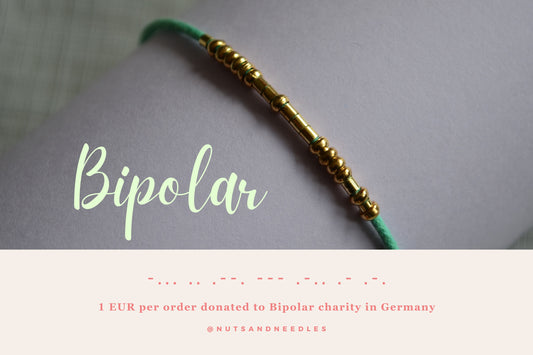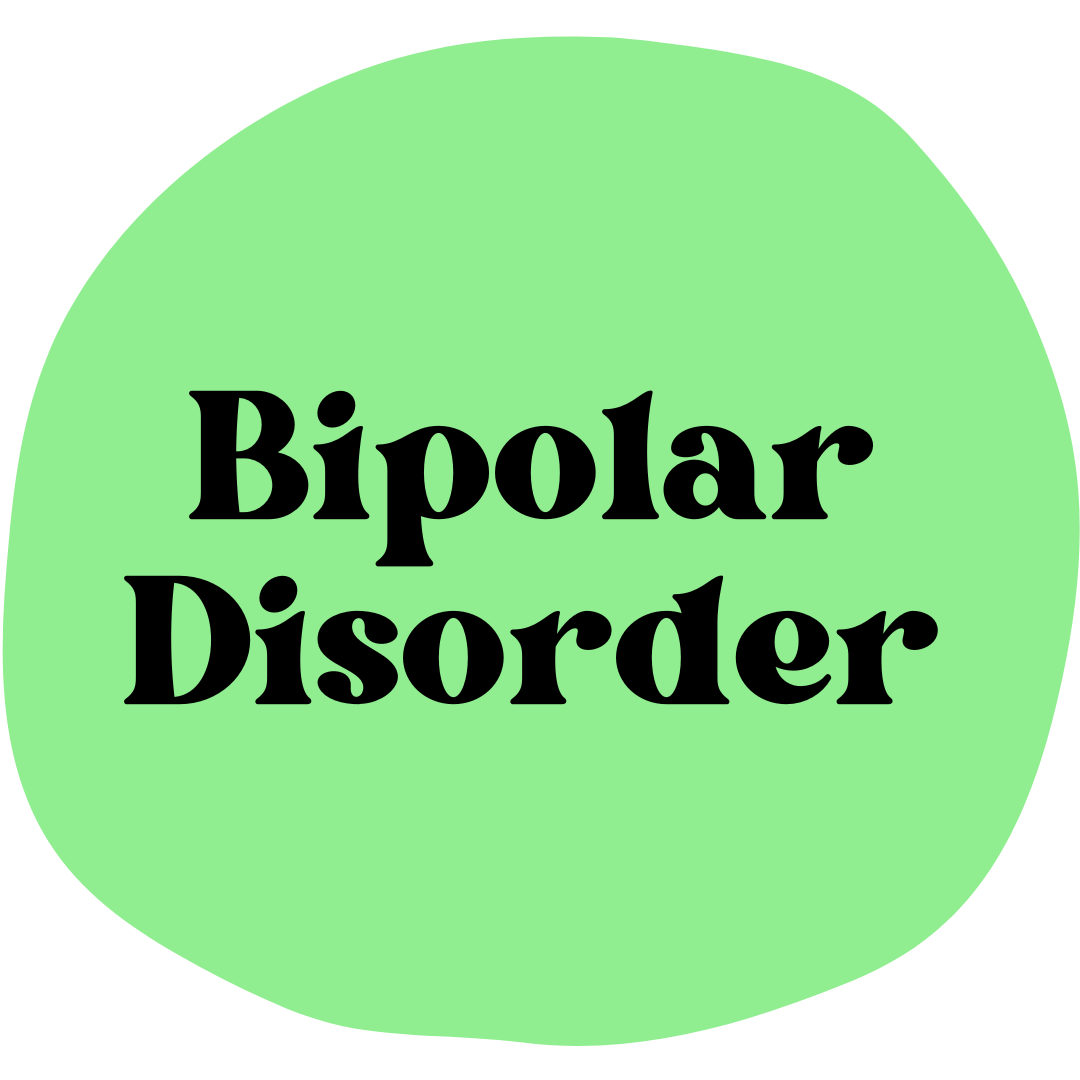written by Sarah Doleschal (nuts&needles)
Every day, people with bipolar disorder - and their loved ones - have to deal with the ups and downs of the condition. It's important to understand how it works and how to help people with bipolar disorder when they're struggling.
Bipolar disorder is a mental illness that causes extreme swings in mood, energy, activity levels and functioning. It can cause serious problems with thinking, relationships and work. There can be periods of both depression and mania. These episodes can last for days, weeks, or months.
Many people with bipolar disorder find that the right treatment can help them control their symptoms so they can live full lives. People who have bipolar disorder often have mood swings that range from a very strong high (called a manic episode) to a very weak low (called a depressive episode).
Bipolar disorder occurs on average by age 30, but can occur at any age.Every day, people with bipolar disorder - and their loved ones - must cope with the ups and downs of this condition. It's important to understand how it works and how to help people with bipolar disorder when they have problems.
Bipolar disorder is a mental illness that causes extreme swings in mood, energy, activity levels and functioning. It can cause serious problems with thinking, relationships and work. There can be periods of both depression and mania. These episodes can last for days, weeks, or months.
Many people with bipolar disorder find that the right treatment can help them control their symptoms so they can live full lives. People who have bipolar disorder often have mood swings that range from a very strong high (called a manic episode) to a very weak low (called a depressive episode).
Bipolar disorder occurs on average by age 30, but can occur at any age.
How does bipolar disorder develop?
There is no definitive answer to the question of how bipolar disorder develops. Some people believe there is a genetic component, while others think environmental factors play a role. In some people, a combination of both is present.
The most common theory is that it is a combination of genetics and environment. There seems to be some sort of genetic predisposition to developing the disease, but the trigger is often an event or series of events in a person's life (such as a traumatic experience).
So how does your family history affect you? The way one person deals with their bipolar disorder may be very different from the way another person deals with it because they had different experiences in their childhood. If you have bipolar disorder, it may be because of your genes or because of an event in your childhood that triggered the disorder - or maybe both!
What challenges do bipolar sufferers face?
People with bipolar disorder face a variety of challenges.
They often struggle with a variety of symptoms - from depression to mania - that affect their lives in profound ways. They also face challenges related to their diagnosis and treatment, including stigma and discrimination, and difficulties at work and in relationships.
Here are some of the most common challenges:
- They often have difficulty maintaining relationships.
- They may feel isolated and lonely even when surrounded by people.
- They may have difficulty finding or keeping a job.
- They may have memory problems or other cognitive problems that make it difficult for them to cope with everyday life.
How can Bipolar Disorder be treated?
The first step in treating bipolar disorder is diagnosis. This means that you should see a doctor who specializes in diagnosing mental illness. Your doctor may use a checklist to help diagnose bipolar disorder. The checklist includes questions about your symptoms and how they affect your life, such as whether they prevent you from going to school or working. Your doctor will also ask about other conditions you have had in the past or currently have, such as schizophrenia or post-traumatic stress disorder. He will also want to know what medications or treatments you have already tried before you come in for an appointment, so he can compare what has been successful in other patients and what might help you.
Once you have been diagnosed with bipolar disorder, there are several treatment options available, depending on what is best for each patient's needs. Treatments include medications such as antipsychotics (to prevent episodes of mania), anti-anxiety medications (to prevent panic attacks), and antidepressants (to prevent depression).
DOs in dealing with people affected by bipolar disorder
It can be difficult to know how best to help someone suffering from bipolar disorder. It's easy to jump in and do everything you can, but sometimes it's better to just listen, be present, and show the person the way. If you're milling about how best to support your* loved one, here are some tips that might help:
- Be patient. Bipolar disorder can be a very difficult illness, and it affects everyone differently. The person you are caring for may have difficulty making plans or keeping up with their medication schedule. Let them know that no matter what happens, someone will always be there for them - you will always be ready to listen or support them when they need it most.
- Don't judge them for their behavior or mood swings. Instead, try to understand what's going on in their head so you can better empathize with them and help them better manage their feelings. Remember that everyone has a bad day - even if those bad days happen a lot!
- Don't give up so quickly; keep trying until you find something that works for both of you.
- Take care of yourself. During this time, it's especially important to focus on your own needs, whether it's taking time away from the relationship or doing things that are good for you.
- Get support. It can be helpful to share with others who have been through similar situations, so feel free to look for support groups or even just friends who have been in similar situations. You don't have to go through this alone!
DON'Ts in dealing with people affected by bipolar disorder
There are some things that should be avoided when dealing with people who suffer from bipolar disorder. Below you will find some tips on what to avoid when dealing with people who are affected by bipolar disorder:
- Don't avoid talking about the problem. If you ignore the symptoms of bipolar disorder, they will not go away. If anything, they will only get worse over time. The best thing you can do is talk openly about it and try to understand what your loved one is going through. This will help him/her feel supported and understood instead of isolated and misunderstood.
- Don't try to do everything yourself, because this will only make you feel stressed and exhausted, which is not good for either partner in this situation! Try not to do everything yourself, but help the person* involved by taking over some chores or responsibilities around the house while they are feeling better so they don't have to worry about it when they are feeling worse again!
- Make sure you are clear about your boundaries. If you don't agree with the person's behavior, set boundaries and stick to them. Let them know if you need help from others yourself or if there is something they can do differently.
- Don't take things personally. Remember that they are not doing anything intentionally, they are just struggling with an illness.
- Be supportive without being pushy or condescending. Tell them what you observe, and let them know that you are there for them if they need help or advice to change their patterns - but don't lecture them!
- Don't tell them they are just being overdramatic or overly sensitive.
- Don't try to convince them of your view of things, even if you think it's the right one (and even if it's wrong).
- Don't tell them that they can't possibly be as bad as they say they are - or that their pain isn't real because it doesn't look like what you would expect from the outside (e.g., physical injuries).
- Don't tell them what medications or therapies "work" for other people with similar problems, because those things may not work for them - and even if they help someone else, that doesn't mean they will be effective for your* loved one!






